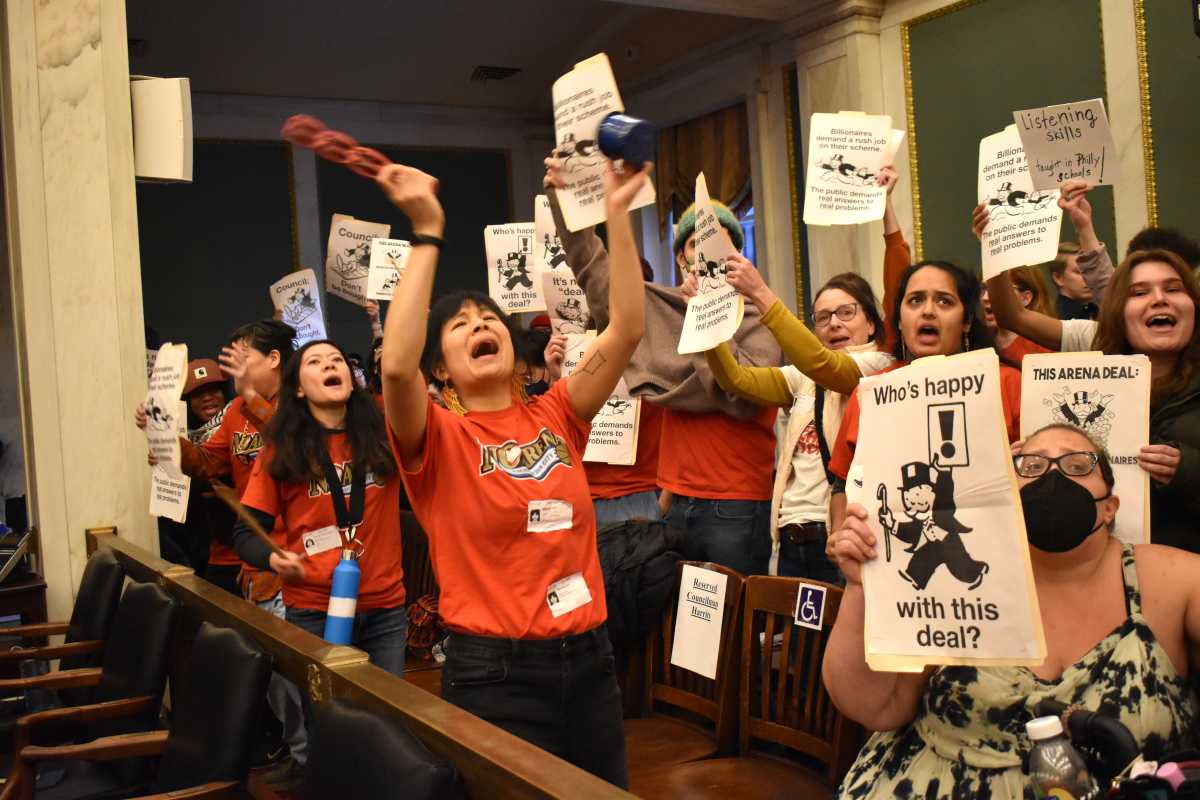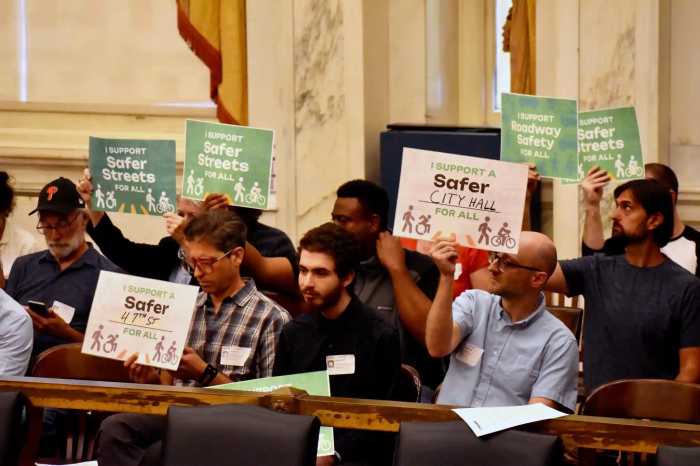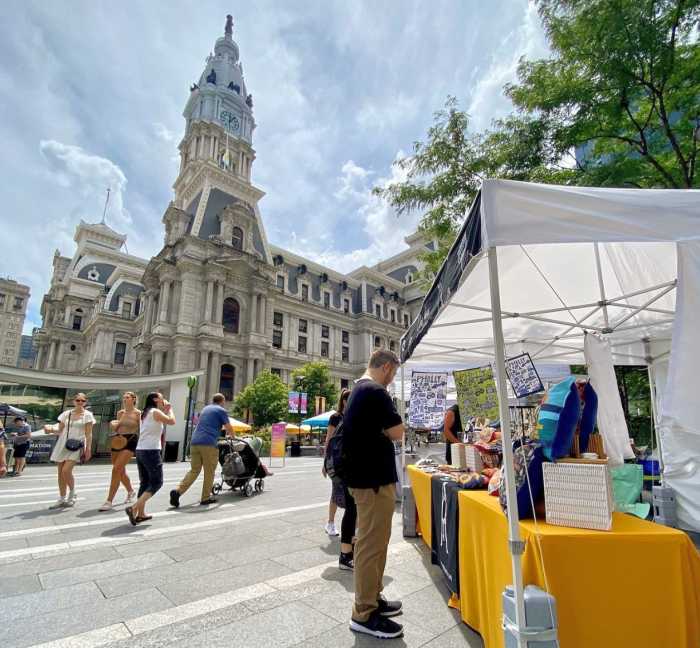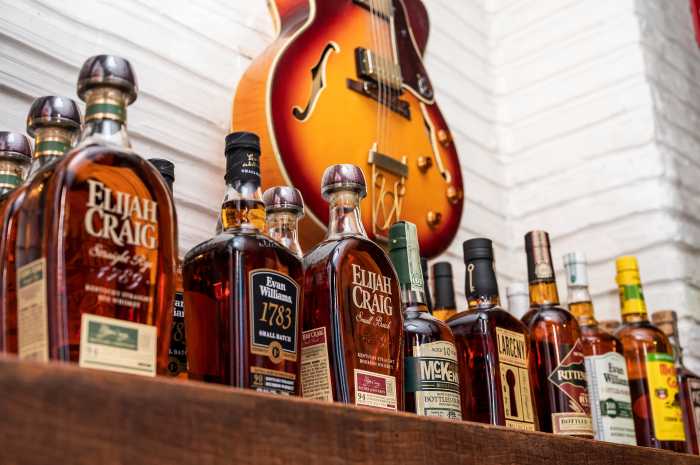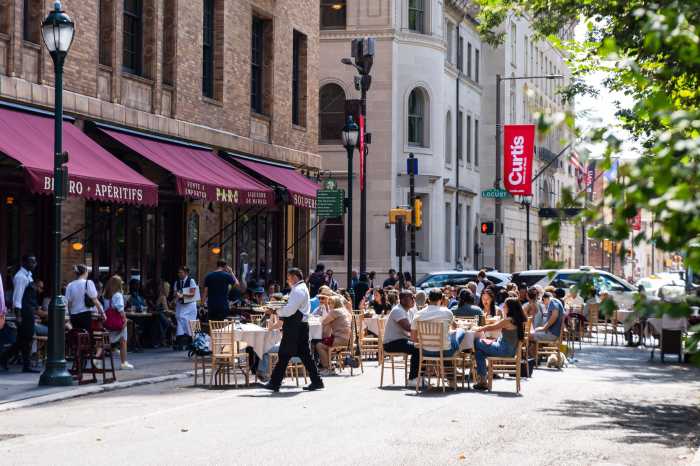City Council granted preliminary approval Thursday to legislation authorizing the 76ers’ controversial plan to build a $1.3 billion arena along Market Street in Center City to move forward.
Lawmakers voted for a package that includes a $60 million community benefits agreement – $10 million more than the deal reached between Mayor Cherelle Parker and the team, but 40% less than Council leadership was pushing for just 24 hours prior.
Amid a cacophony of chants inside Council chambers – mainly emanating opponents of the project – the measures advanced in a 12-to-4 vote, with Kendra Brooks absent. Jamie Gauthier, Rue Landau, Jeffery Young Jr. and Nicolas O’Rourke voted “nay.”
A final vote is set to take place this week, at a special session Thursday, Dec. 19, and the legislation is expected to pass by a similar margin.
Chinatown activists vowed to continue fighting the arena, known for now as 76 Place as Market East, and a coalition organizing opposition to the project accused lawmakers of “capitulating” to pressure from the 76ers’ billionaire owners.
Xu Lin, who runs Chinatown’s Bubblefish restaurant, does not believe his business will survive the six-year construction process.
“What happened today at City Council was a disgrace,” he said moments after the vote. “It was a disappointment. It was a betrayal.”

A section of the Fashion District mall, between 10th and 11th streets between Market and Filbert, would be knocked to make way for the 18,500-seat arena.
Officials from Harris Blitzer Sports & Entertainment, which owns the team, have said getting Council approval before the end of the year is crucial for the project to remain on schedule. The team wants to begin demolition in 2026 and open 76 Place in time for the 2031-32 NBA season, when the franchise’s lease expires at the Wells Fargo Center.
“We appreciate City Council advancing these bills,” a 76ers spokesperson told Metro on Thursday. “This is an important next step in building 76 Place. We are reviewing the amendments that were added today to ensure they align with our understanding of our agreement with the city.”
Hearings on the arena concluded Dec. 3, and a committee vote, a requisite step for bills to advance to final passage, was repeatedly delayed as negotiations between Council leaders and HBSE continued, primarily over the CBA payout.
The 76ers had offered $50 million over the construction period and 30 years of anticipated operation, and that amount was incorporated into the agreement with the Parker administration. Not long after the arena legislation was formally introduced in October, lawmakers signaled the total was not enough to mitigate the development’s potential negative impacts.
On Wednesday morning, Council leadership proposed a $100 million CBA. It fell to around $75 million early Thursday before landing at $60 million, a number HBSE had been more comfortable with early in the week, according to sources.

Parker, to help secure Council support, committed to spending $20 million on affordable housing in Chinatown. Few details about the allocation have been released, and the Mayor’s Office declined to share more information.
Councilmember Mark Squilla, who represents the arena site and has been heavily involved in talks with the 76ers, said the funding will be part of Parker’s forthcoming broader plan to create or preserve 30,000 units of affordable housing in her first term. He said the $20 million would not necessarily be city dollars.
“The mayor’s going to make an announcement of where that money’s coming from,” Squilla told reporters.
Jessie Lawrence, director of the city’s Department of Planning and Development, also assured Squilla that the Parker administration intends to transfer the former 6th Police District station on 11th Street to an affordable housing developer, likely the Philadelphia Chinatown Development Corporation (PCDC), according to a Dec. 11 letter obtained by Metro.
Gauthier was in tears in the aftermath of the preliminary vote and lamented that the deal, in her opinion, does not include the necessary protections for Chinatown. Line items for affordable housing, a Chinatown land trust and a fund for longstanding businesses were slashed, compared with earlier proposals.
“I think what happened today was wrong, and I think we should care more about our impacted community than big-money folk that want to rush stuff through Council,” Gauthier said.
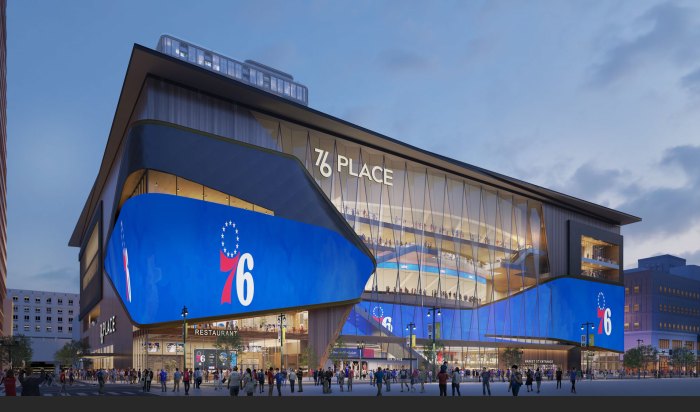
While the $100 million CBA devoted $12 million to housing support programs, the agreement approved Thursday included just $3 million. A land trust, to be administered by the PCDC, is slated to receive just $250,000, down from $5 million.
Two million is being dedicated to “legacy” Chinatown establishments, compared to $5 million in Wednesday’s Council CBA.
A fund to distribute grants to businesses impacted by construction is set to receive $5 million, up from $1.6 million in Parker’s agreement but below the $10 million earmarked in lawmakers’ earlier proposal.
Funding was still boosted for an arena special services district (from $14 million to $17.5 million) and nearly $12 million remained for a pair of the mayor’s citywide priorities – year-round, extended day schooling and a college program to train municipal workers.
“Today, City Council took monumental action on this $1.3 billion economic development project for Philadelphia that, as I have consistently said, extends far beyond the basketball,” Parker said in a Dec. 12 statement.



